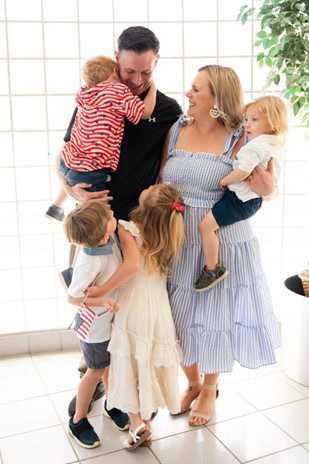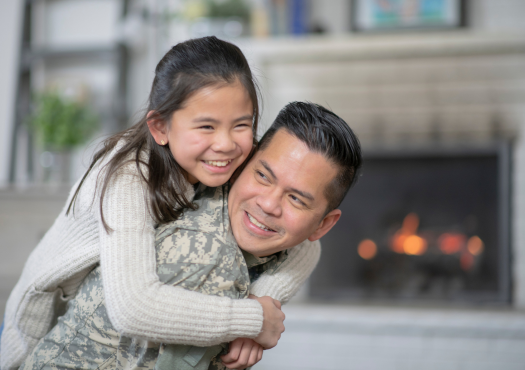By Jenny Rea, PhD
More than 1.3 million active-duty members serve in the U.S. military (Department of Defense [DoD], 2021). Over half have deployed more than once (Wenger et al., 2018). The majority are married, and 41% have children under the age of five (DoD, 2021). Men make up about 83% of the armed forces (DoD, 2021). This fact suggests that many active-duty fathers experience deployment-related separations from their young children.
Active-duty military fathers are frequently away from their families throughout their military careers. After each separation, they are faced with readjusting back to work and family life. Navigating the deployment cycle is unique to all active-duty service members and their families. Various parenting and family challenges may arise during the deployment cycle, distinct from the experiences of their civilian counterparts Blankenship et al., 2023).
Fathers can significantly influence their child’s socioemotional and cognitive development. Coping with feelings, setting goals, and helping children to think or explore are just a few examples. Fathers can also assist in their child’s educational achievement and psychological adjustment. Strategies might include fathers helping their children achieve short- or long-term education goals or seeking support from a trained professional with their child’s mental health needs.
Research suggests that very young children (0-5 years) are the most vulnerable to experiencing deployment-related separation. Younger children show behavioral problems and attachment difficulties during the deployment and the reintegration period, such as difficulty sleeping, bed wetting, nightmares, excessive clinginess, and difficulty trusting the deployed parent or respecting their authority (Blankenship et al., 2023).
A recent study by Blankenship et al. (2023) explored factors that eased or hampered family adjustment during military fathers’ reintegration. Fifteen active-duty Army fathers were interviewed, and seven themes emerged. Specifically, the study found:
- 60% of fathers said that spending quality time with children to connect intentionally strengthened their bond during reintegration.
- 33% reported growth in themselves, their family members, or their family unit since their deployment.
- 27% of fathers reported that viewing reintegration from their child’s perspective helped them be more sensitive to their child’s needs.
- 27% prioritized connecting with their child (e.g., reading over the phone, video chatting) while deployed to ease their adjustment upon reunion.
- 93% struggled to shift from the “deployed Soldier” role to that of father, husband, or co-parent.
- 80% of fathers said their children reacted negatively to their homecoming (e.g., fear, distance, anxiety). These reactions caused distress for many fathers.
- 27% had difficulty managing negative emotions, such as irritability and anger, in their interactions with other family members.

Jenny R’s family at homecoming | Photo credit Hannah Mae Photography
We have compiled a brief (but not comprehensive) list of strategies based on the Blankenship et al. (2023) study findings. Here are just a few ideas on ways to better support military fathers and their families.:
- Help families during the pre-deployment phase to strategize ways to stay connected during deployment to ease the adjustment at reintegration.
- Teach fathers ways to engage in perspective-taking to be more sensitive to their child’s (and their family’s) needs at reintegration.
- Encourage families adjusting to reintegration to utilize services like Morale, Welfare, and Recreation (MWR) to find family-friendly activities (e.g., camping) to reconnect.
- Build upon resilient families’ strengths in order to utilize these skills as a tool for other families in need of support through the deployment cycle.
- Promote continued family resiliency by sharing evidence-based reintegration programs with families such as Strong Families Strong Forces and After Deployment: Adaptive Parenting Tools (ADAPT).
- Connect families with Military and Family Life Counselors to help talk through parenting challenges and military life stresses.
References
- Blankenship, A. E., Drew, A. L., Jacoby, V. M., Zolinski, S. K., Ojeda, A. R., Dondanville, K. A., Sharrieff, A.-F. M., … DeVoe, E. R. (2023). Qualitative examination of homecoming experiences among active-duty military fathers during reintegration. Qualitative Social Work. Advance online publication. https://doi.org/10.1177/14733250221150378
- Department of Defense. (2021). 2021 Demographics Profile of the Military Community. https://download.militaryonesource.mil/12038/MOS/Reports/2021-demographics-report.pdf
- Department of Defense. (2021). 2021 Demographics Profile- Active-Duty Families. https://download.militaryonesource.mil/12038/MOS/Infographic/2021-demographics-active-duty-families.pdf
- Wenger J.W., O’Connell, C., & Cottrell, L. (2018). Examination of Recent Deployment Experiences across the Services and Components. RAND Corporation.
Writers Biography
Jenny Rea, Ph.D., is a military spouse and mom of four kiddos under six years. Jenny consults with OneOp and is an Assistant Professor of Practice in the Department of Human Services and Director of the Certificate in Military Families at the University of Arizona.
Photo source: Jenny Rae















